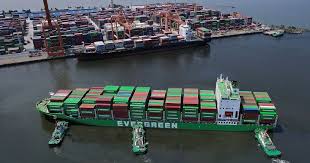On Friday, April 11, major maritime nations approved the world’s first tax on CO2 emissions from ships, a historic measure to combat climate change.
This tax, set at $100 per tonne of CO2, will apply to ships whose emissions are not already offset by contributions to the International Maritime Organization’s (IMO) « net zero » fund. It will come into effect in 2028.
Maritime transport accounts for 3% of global greenhouse gas emissions, largely due to the increasing size of ships, which consume more fuel. This tax is part of a broader set of measures aimed at reducing the sector’s carbon footprint while encouraging the adoption of more eco-friendly marine fuels.
A Major Step Towards Maritime Decarbonization
Arsenio Dominguez, Secretary-General of the IMO, praised the agreement as a « good outcome » for the organization, highlighting that it brings the sector closer to global decarbonization measures, including a pricing mechanism. This agreement marks a significant advance in the energy transition for the maritime transport sector.
Discussions, led by over 60 countries, saw Pacific island nations, particularly vulnerable to climate change effects, advocating strongly for the tax. Other countries like China, Brazil, and Saudi Arabia initially proposed an emissions credit model. Ultimately, a compromise was reached between the tax and the credit system.
A Complex Yet Crucial Challenge
« It’s not easy to reach these agreements, » Dominguez said. « We are the first to secure an agreement on an international emission pricing mechanism. » This achievement is especially notable as the maritime sector is notoriously difficult to regulate.
The IMO has also set standards for marine fuels, aiming to promote the use of less polluting alternatives. These measures align with a long-term goal: to achieve net-zero emissions for the maritime sector by 2050.
Crucial Impact for the Energy Transition
Maritime transport plays a key role in the global supply chain, and the implementation of this tax represents a turning point in the fight against global warming. By reducing the carbon footprint of this sector, the IMO hopes to influence other industries and governments worldwide.
Source: africanews




